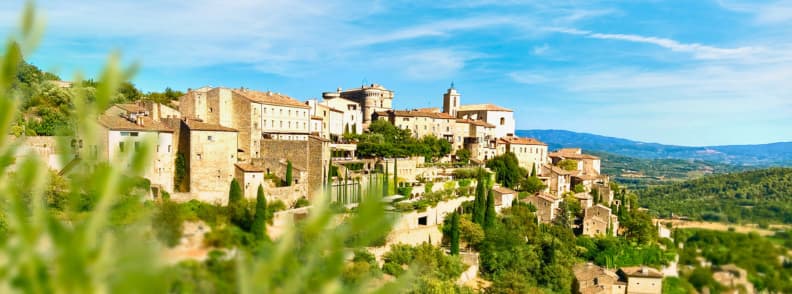Is moving to a small village in France right for you? It’s easy to dream about olive groves, weekly markets, and slow afternoons in the sun. Every year, thousands are drawn to the South of France chasing a quieter life in picture-perfect villages like our Bagnols-en-Forêt.
But what is it really like living in a small village in the South of France as an expat? The truth is less polished than you might expect, and far more rewarding if you know what you’re walking into.
Life in a French Village
This guide is for anyone seriously considering moving to a small village in the South of France. You’ll get practical advice on choosing the right village, finding accommodation, understanding real costs, adapting to local culture, and building a meaningful life beyond the postcard. I’ll share what worked, what didn’t, and what I wish I had known before trading a busy city life for the deep quiet of a French hillside.
If you’re ready to go beyond the fantasy and hear the real story, then read on.
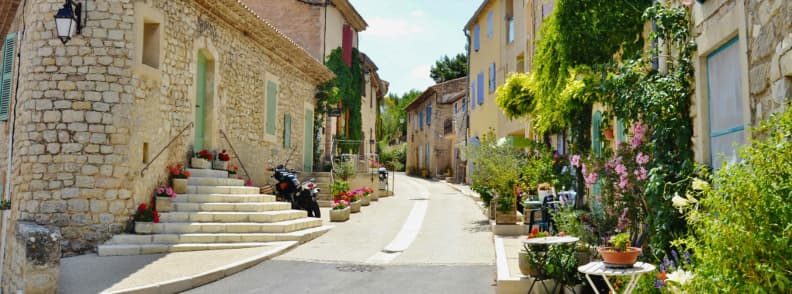
Is Moving to a Small Village in France Right for You?
Is moving to a small village in France right for you? This is a question that deserves more than a romantic answer. Life in a French village looks beautiful from the outside, and it often is, but it demands sacrifices and adjustments that you need to be honest about from the start.
When we first thought about moving to a small village in the South of France, it wasn’t planned. In early 2020, we had come to France looking for a sailboat, planning to sail the Mediterranean. We bought the boat, and then the pandemic hit. Lockdown found us moored here, unexpectedly still on land.
At that time, we already knew Mathieu’s mother was going to move here. His older sister lived here with her family (our nieces and their dad), and his younger sister was considering moving soon, too. Spending the lockdown here, seeing how life could be, we felt a little jealous. The idea grew naturally: we like the place, we like the people, why not stay?
Mathieu had spent every summer holiday here for more than thirty years. For him, it always felt like a second home. For me, it started to feel right also. It was a place where daily life could feel like being on holiday, but real and grounded at the same time. It wasn’t a strategic decision. It was a gut feeling that pulled both of us toward staying.
But that first feeling of blending into French village life was different from staying for good.
If you’re thinking about making this move, you need to stop and ask yourself:
- Why do you want to move to a French village?
- Do you speak French (and not just tourist French)?
- Are you prepared for daily life without easy public transport?
- Can you afford to buy or rent realistically in the South of France?
- Are you ready for real cultural differences that won’t disappear with a smile?
The truth is, French village life vs city life is a complete shift. It’s not just smaller. It’s quieter. Slower. More isolated, especially if you don’t drive or don’t have close family around. After my son was born, the reality hit hard. Without my mother nearby, without close friends to lean on, and with my husband working long hours, I felt the full weight of living far from the life I knew. Breastfeeding for what felt like all the time, with only a few sleepy text messages for support, left me feeling invisible sometimes.
Language is another wall you can’t ignore. Even though this is a tourist region, not many locals speak English. And when my husband and I spoke English between ourselves, people often assumed we were just passing through. Restaurants, shops… we were (and in some places still are) outsiders unless we’re with French-speaking friends or family. Being taken for a tourist wears you down when you’re trying to build a real life.
👉 If you don’t feel comfortable having at least simple conversations in French (in shops, doctor’s offices, with school staff), life here will feel harder and more lonely than you imagine.
There’s another layer that few outsiders prepare for: local politics and attitudes toward foreigners. Villages like mine aren’t always welcoming. A lot of people vote for parties that want fewer immigrants. Even as an EU citizen, speaking French, married into a local family, you feel it. Integration isn’t automatic. It takes a long time, showing up again and again, even when no one seems to notice you.
And then there’s the cost. Because of the tourism economy, housing prices are high compared to average local salaries. Most houses with gardens are out of reach unless you move further inland. Secondary homes (vacation houses left empty most of the year) and short-term rentals drive up prices. Land is expensive. Building is heavily restricted because of water shortages. Raising kids here means extra commuting, limited schooling choices, and financial trade-offs most people don’t think about at first.
👉 If you plan to move with kids, know that good schooling, social opportunities, and even healthcare access become harder outside the big towns, and a car isn’t optional.
So, should you move to a French village? Only if you love the quiet more than convenience. Only if you’re serious about learning the language and being patient with closed doors. Only if you understand that even in the most beautiful places, real life (not the postcard) is what you’re choosing.
For me, despite all of it, there’s still nothing like standing at our window and watching the sun set over the hills in front. The valley separating us from those hills stays green most of the year, even in winter. Every day, the seasons paint the hills differently. It’s a view that reminds me time and time again why we stayed. But no one handed that feeling to me. It was earned.

Daily Life in a Small Southern French Village
What is a typical day living in small village in the South of France for an expat? It’s quiet, repetitive, and very different from what you imagine if you’re used to city life. Daily life in small French villages brings fewer options, slower rhythms, and a lot of self-made routines.
Our village has only one bakery. If you want croissants, you need to be there early. I love their bread, but the choices are very limited when it comes to pastries. This is one of the small realities of life in a French village: no endless selection, no guarantee you’ll find what you’re craving.
We have only two market days per week. The market is tiny: one stand with vegetables, one with a bit of cheese, sometimes a trîteur with take-away food or a poissonnier selling fresh fish. But compared to bigger towns, it’s very modest. Forget the postcard image of lively and colorful Provençal markets happening daily.
Daily life for families is simple but limited. We have a small playground, but it’s not shaded and not very interesting for young children. Now that our son is walking around easily, I will be using pedestrian areas more, but even that means rotating through the same few streets.
Life as an expat in a French village means getting used to repetitive routes unless you want to drive. And I don’t enjoy wasting an hour just driving to walk somewhere new. That time could be spent working, cooking, or actually doing something productive. That’s another hidden side of daily routines here: you sacrifice variety for peace.
👉 Living in a South of France village means you’ll drive for everything: playgrounds, shopping, even basic errands.
We attend village events like fêtes or seasonal markets when they happen. There’s also a cinéma itinérant showing French films on Monday nights. But if you love watching movies in their original versions with subtitles, it’s disappointing. Even in Cannes, most films are dubbed into French, and over time, I gave up going to the cinema altogether.
Living daily life in a small village in the South of France is a stark contrast to how I lived before in Bucharest. There, I could attend free cultural events year-round, walk around in new places every day, see a lot of people I’ve met over the years, and go to international bookshops. With my son, when I visit, I can choose between 8 playgrounds within 15 minutes’ walking distance of our flat. Here, unless you get in your car, every day looks more or less the same.
Still, there’s a quiet beauty if you know how to find it. Watching sunsets over the Massif de l’Estérel. Enjoying the silence and the slower rhythm of life. Being away from the crowds. Seeing the seasons change across the valley. Having hot water all the time and drinkable tap water, which even in 2025 is impossible in Romania’s capital city. Access to better products at the supermarket for a pretty similar price. It’s a different kind of richness, one you have to find or build for yourself.
Community, Friends, and Social Events in a French Village
What is community life for expats in small village South France? It’s slower to build than you might hope, and often lonelier than you expect. Making friends in rural France takes persistence, patience, and time.
When we first moved, I didn’t think making connections would be so difficult. I spoke French (not perfectly, but well enough). My husband’s family lived nearby. We were polite, and we participated. But building a real social life in a French village is very different from just being present.
👉 Integration doesn’t happen automatically. Even speaking good French doesn’t mean people will welcome you right away.
In villages like ours, I found people to be cautious of newcomers. There have been times when I have felt better integrated in hostels with complete strangers than here with people I had seen several times. Locals have often lived here for generations. They already have their circles formed of family, childhood friends, and old neighbors. There’s no real incentive for them to expand that circle. Friendships here are built slowly, over shared work, shared children, shared experiences, and a lot of silent observation first.
One thing few people talk about: most people moving to or living in small villages in the South of France are older. Many are retirees. Others, like Mathieu’s older sister, moved here, married young, and had children early, and are in a completely different life stage. We came late. We had our son late. We joined the party years behind most of our neighbors. Finding people our age with children our son’s age is more difficult than we had thought.
👉 Expect to find more grandparents than parents your age if you move to a small village with young children.
I’m hoping this will shift a little when William starts kindergarten. I plan to join the Parents’ Association (Festi’Kids) to help organize events for the little ones. I have experience in event planning, and I hope this will be a way to contribute and meet other parents.
For now, though, even when I take my son to activities like Motribébé at Saint-Raphaël, or to playgrounds in nearby towns, there’s still a wall. We do OPOL (one-parent-one-language), and speaking Romanian to my son makes some people assume I don’t speak French. I try to say a few words in French to other parents, but it often feels awkward. I’m an introvert by nature, and I often end up feeling misplaced, caught between wanting to connect and feeling like an outsider.
Still, we’re trying. We plan to take advantage of the Fête des Voisins (Neighbors’ Day) at the end of May to get to know younger families who have recently moved into the village. We also want to stay connected to our older neighbors, whom we’ve grown to love. Building a tiny circle of real friends feels important now. A life where you know and trust the people around you.
Volunteering is one of the best ways to break through isolation. I joined BAT (Bagnols Animation Tourisme) to help organize the Marché d’Antan, the big traditional market. Unfortunately, bad weather canceled the event this year, but the effort wasn’t wasted. People noticed when I showed up and stayed involved, even when things didn’t go as planned.
👉 If you want to build a real life in a French village, you have to show up. Associations, fêtes, school events. That’s where community happens.
But no matter what you do, making friends in rural France is slow. Sometimes you feel welcome. Sometimes you feel invisible. You have to keep trying. Because village life won’t come to you. You have to go to it.
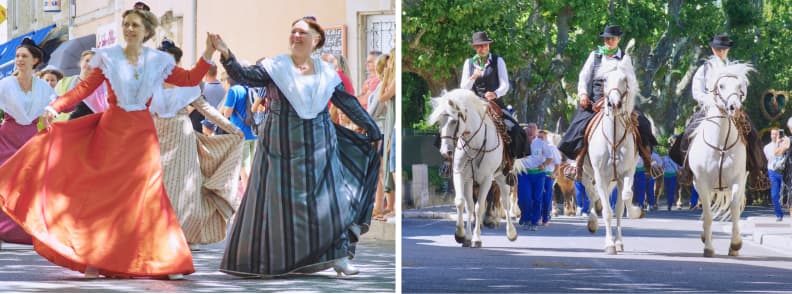
Practical Steps to Relocate to a French Village
How do you actually move to a small village in the South of France? It sounds simple, but relocating to a French village comes with hidden steps, missing information, and a lot more paperwork than you might expect, even if you’re an EU citizen like I am.
If you’re not from the EU, you’ll need a long-stay visa (visa de long séjour) before arriving. Long-term visa options for expats in rural South of France vary depending on your status: self-employed, retired, family reunification, or working with a French employer. Application procedures are slow, paperwork-heavy, and often vary by prefecture, so it’s important to research the specific category that fits your situation before moving.
👉 Start your visa process at least six months in advance. Delays are common, especially for rural addresses.
If you’re from the EU, you don’t need a visa to live and work in France. But even as an EU citizen, being “free to move” doesn’t mean you’ll avoid French bureaucracy. Get ready to fight for every paper you need.
In my case, I came from Romania, an EU country, and still faced huge delays when trying to get my French social security number and register my auto-entrepreneur business. I spent months calling CPAM and URSSAF. At one point, my file was lost. Someone even called pretending it was being processed, but it turned out to be false…
Without my husband’s help, and without pushing URSSAF directly, I probably would have waited a year or more to work legally. On expat groups, I’ve learned it’s lucky to get your French social security number within a year and that it’s very frequent for them to lose paperwork.
👉 Files get lost. Calls go unanswered. Expect mistakes. Always follow up. Weekly if needed.
Setting up your life legally in France means:
- Getting a French phone number early. Most agencies and offices expect it. In the beginning, I gave them my husband’s number, but then got my own.
- Opening a French bank account. For this, you need a French address. And to rent a place, you need a French bank account. It’s very difficult to escape this vicious circle.
- Registering with CPAM for healthcare (if you’re working or living long-term).
- Registering a business if you plan to be self-employed (auto-entrepreneur status is the simplest, but it comes with high taxes and no expense deductions).
👉 Obtaining a French bank account is a lot easier since Revolut started offering the option of switching your Euro account to a French IBAN. Don’t have Revolut? Open an account now.
Finding a Place to Live. Rentals and Real Estate in French Villages
Finding accommodation in South of France villages is harder than in cities and full of traps no one warns you about.
We bought our home, but during the process, we learned a lot:
- Exclusive real estate contracts are common. Even if you find a place privately, the agency still gets a commission.
- Many properties are secondary homes owned by people who don’t live locally, which pushes up prices and limits availability.
- If you’re looking for a rental, landlords expect a huge file, even if you’re financially stable.
If you plan to buy, also expect notaire fees (legal fees for property purchase) and renovation costs (older houses are rarely turnkey). Properties with gardens or good insulation are expensive and sell quickly.
In our case, we were lucky. We found a village house without a garden, but with an amazing view. It wasn’t perfect, but it was within budget. Compared to the prices of houses for sale around it, it felt reasonable: it had a larger surface and we didn’t have a lot of work to make it liveable. We painted everything, put laminate flooring on the highest floor, changed one of the shower cabins, redid the walls in the other bathroom, replaced the electric heaters and added a fireplace insert.
We made an offer in August 2021, but the sale was finalised a lot later. So we got the house at the beginning of December, and renovated enough to host the Christmas dinner (and Mathieu’s grandfather) at our place.
👉 If you want a garden or a fully renovated house near the Riviera, prepare for serious competition and serious prices.
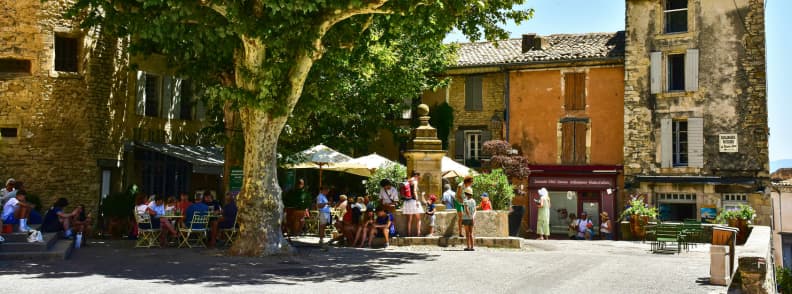
Language, Etiquette, and Cultural Differences in French Villages
What cultural differences should you expect when moving to a small village in the South of France? Living daily life in a French village as an expat means adjusting to much more than just a new address. Learning French, adapting to rural etiquette, and navigating cultural habits are all part of daily survival, not just extras.
Mastering French in Different Settings and Scenarios
Speaking French is not optional here. Even though we live in a region flooded by tourists every summer, most locals do not speak English, and they do not expect to accommodate you.
I had studied French in school for eight years, but without a lot of speaking practice. So, in the beginning, real-life conversation was a different challenge for me. At first, I could only speak comfortably with my then-three-year-old niece and my husband’s grandfather. They were patient and spoke more slowly. The rest of the adults not so much, especially when you factor in verlan and other terms you usually hear during apéro.
One lesson came the hard way. We were playing charades with my niece. She was miming that she was a princess, waving her arms dramatically. Trying to keep the game lively, I guessed: “Ah, you’re a pouffe!” The room froze. My husband burst into laughter. My niece’s father looked horrified. Well, pouffe is a shortened form of poufiasse, a deeply rude word. That’s the kind of thing you don’t learn in language classes. It’s the kind of mistake you make when you absorb the language people use casually around you, without realizing which words carry a punch or are not to be used around children.
But I worked hard on my French (and I’m still improving it). One year after my first visit, someone actually asked my husband if he had returned with the same girl, because “this one” speaks French. However, it annoys me that I can’t grasp the French accent in French, because I did get a French accent… in English. Some friends who are English teachers noticed it.
Essential French Etiquette for Rural Living
Essential French etiquette for rural living is strict, even if no one spells it out.
Always say Bonjour when you enter a shop, the doctor’s office, a bakery… anywhere. And always say Au revoir when you leave. I know this is basic, but I’ve seen a lot of social media videos where people declared themselves surprised over this, so I thought it’s worth a mention.
In social settings, kissing on the cheek (la bise) is expected when you know people or you’re getting introduced to people. Luckily, it’s done a bit less post-pandemic. But at family get-togethers or other social gatherings, you’re expected to greet almost everyone individually. Makes me think of Paul Taylor’s Franglais bit every time:
Building Relationships in Rural France
Let’s address the cultural reality of how language shapes relationships here. Even if you speak French well, not sounding “local” marks you immediately. In small villages, it’s not just what you say, it’s how you say it. Accent matters. Phrasing matters. Formality matters. And you feel judged in small, silent ways for all of it.
Even when I manage perfect sentences, my accent signals that I’m not from here. People switch how they speak to me. Some slow down unnaturally. Others cut the conversation short. You learn quickly that communication isn’t just language skills, it’s belonging codes you can’t fake.
👉 In small villages, your accent speaks louder than your grammar. It affects how fast you build trust, no matter how fluent you are.
One night, I was at dinner with family and the man who plans to run against our current mayor. (I’m not a fan of the current mayor, and I actually used to look up to this guy until then.) I faced the usual jokes about how Romanians are the same as Romani people, about my accent, and so on. I laughed at first. I usually do and I brush it off.
But that night, something cracked. I said, honestly, twice that though it may seem funny in the moment, on the days when I find it difficult to be in France, those things hit hard. And it was one of those times when I was already feeling super isolated and misplaced in France.
I hoped that was enough to stop. But this guy… he just couldn’t help himself. The punchline seems to have meant more to him than my discomfort. Maybe he’s the better candidate for the village. But on a human level? I’m not a fan, especially since his ex was Romanian, so I’m certain he knew how some of those jokes land. Not to mention that I couldn’t get a word in about what felt concerning to me about the future of our village.
👉 You can be integrated on paper, fluent in the language, active in the village, and still feel like an outsider at the wrong dinner table.
I majored in Political Science, and I want to get involved in village life more. The city hall is searching for référents de quartiers (neighborhood representatives), but having to speak out to and for a large audience freaks me out, especially under the circumstances. If even the potential future mayor can’t help joking about my accent and my nationality, what expectations can I have from everyone else?
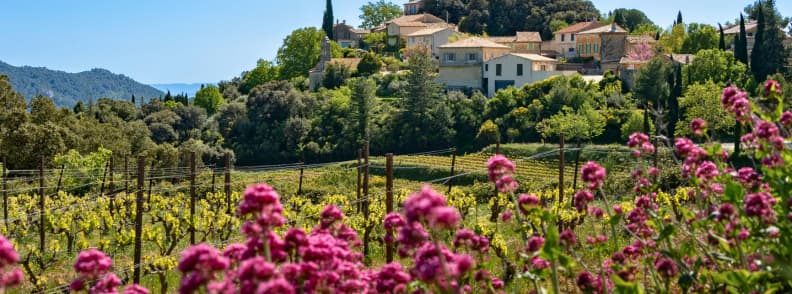
Understanding the Cost of La Vie Française. What Living in a French Village Really Costs
What is the cost of living in South of France villages really? You’ll hear it’s cheaper than Paris or more affordable than the Riviera. And that’s true. But living in a French village still comes with real financial pressure, especially if you’re raising a child, buying property, or running a business.
Here’s what we actually pay each month as a family of three in a village house 30 minutes away from the coast:
Real Monthly Living Costs
- Electricity: about €180 per month (for a village house with basic insulation and using wood to heat up part of the house in winter).
- Internet: about €30 per month.
- Water: about €82 per month (and rising since water restrictions are common now).
- Groceries: around €120–140 every 10 days for a family of three. We buy local when possible, use drives to save time, and cook at home almost every day. This cost doesn’t include baby formula, I’m still breastfeeding.
- Mutuelle (private health insurance): €124 per month for the family, half subsidized through employer benefits.
- Taxe foncière (property tax): about €1,000 per year.
- House insurance: about €20 per month.
- Car insurance and maintenance (done by my husband): about €60 per month, for an older car with basic coverage.
- Couches/diapers: about €30 per month (using a store brand that’s clean in components and affordable).
- Trash tax (redevance incitative): €317 for a maximum of 26 bags of 50L per year. Each extra bag above that will be charged at €2,40.
- Petrol: essential because you can’t rely on public transport and fluctuating prices hit rural areas hard.
👉 Trash will be charged by volume or number of collections. Waste less, pay less. In theory, because in practice it’s very discriminatory to people who live in the village, especially the elderly who can’t carry 50L bags or raise them to the height of the bins, and young parents who can’t keep used diapers in the house for 2 weeks. People who throw less but more frequently in communal bins haven’t been taken into consideration when drafting the subscription plans.
Housing Costs in South of France Villages (2025 estimate)
We don’t pay rent, we bought a house. But if we had waited another year, we might have been priced out of our own village. Buying property in South of France villages has become harder every year. A house with a garden? Way out of our range. What we found was a village home with no garden. It’s not perfect, but it was affordable. That combination is rare now.
Some numbers to get an idea of housing costs French countryside:
- Small village homes inland (no garden): €180,000 – €250,000
- Homes with garden, near services or coast: €350,000 – €600,000+
- Buildable land: very limited, very expensive due to water restrictions and zoning limits
- Notaire fees on purchases: ~7–8% of sale price
👉 Drought-related building restrictions are pushing up land prices fast. Check the mairie regulations before buying terrain.
Daily Spending Adds Up
Even small daily habits come with surprise price tags. Markets are cheaper if you shop smart, but still limited. We cook almost every meal at home. Restaurant meals? Rare. Takeaway? Sometimes, but it’s expensive to do it on a regular basis, and the options are limited unless you drive 20–30 minutes.
Inflation is constant. Groceries, electricity, and fuel costs have all risen since we moved. We buy more local produce, stock up during promotions, and plan everything around the drive pick-up to avoid wasting time and petrol.
👉 Do drives (online supermarket orders) and cook at home. If you have a garden, try growing your own vegetables and hope for a year without water restrictions. It’s the only way to keep your food budget under control.
What Most Guides Don’t Tell You
- Public transport is not a budget alternative. You’ll need a car.
- Day nurseries are not easily available, and villages have nannies that are booked early.
- Secondary homes raise prices even in tiny inland villages.
- Extra room for a growing child? A second child? That means moving, and moving again means money.
I’d like to have another child but not until we can afford more space. Right now, that would mean buying again, maybe further away, with even less social life and fewer services. That’s the hard math of village life.
Cost of living in a small French village is manageable but not cheap. And certainly not easy for young families unless you already own, already work remotely, or already have strong support nearby. Ok, or you’re super rich and can afford everything, but that wasn’t and isn’t our case.
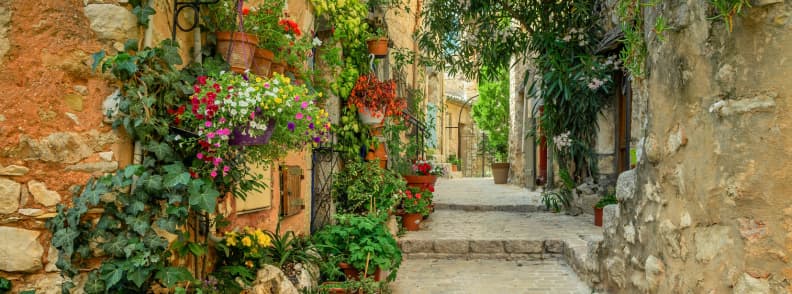
Challenges and Rewards of Rural Expat Life
Living in a small French village as an expat is a trade. You give up one kind of life to build another. It’s not about escaping city stress or chasing a slower pace. It’s about deciding what you’re willing to lose and what you’re willing to work for.
What You Give Up or the Challenges of Rural Expat Life in France
- Professional networks shrink. In the village, opportunities are rare, and you rely on online connections or commuting.
- Cultural access almost disappears. Free concerts are rare outside the tourist season. Exhibitions or last-minute museum visits require traveling. Every event is a plan, not a discovery.
- Daily variety fades. The same few streets, the same playground, the same routines… unless you spend hours driving.
- Public services are limited. You wait longer for appointments. You have fewer choices for schools, doctors, and childcare.
- You’re always marked as different. Accent, habits, language, and other mistakes expats make in French countryside. They don’t go away. And some people will remind you.
👉 If you need external stimulation to feel alive, village life will wear you down faster than you expect.
What You Actually Gain When Living in Rural South of France as an Expat
- Real silence. Mornings without sirens. Nights without traffic noise, especially in the low season. Just birds, rain, and wind through trees.
- Stronger family bonds. Life slows down enough that meals, conversations, and ordinary days matter more.
- Access to nature every day. Forests, trails, mountains, and beaches. No admission fees, no tickets, usually no crowds. I love that when my son grows a bit older, we’ll go to the forest for him to play while breathing fresh air. And that we can go to the beach whenever we feel like it.
- Vacation feeling after a 20-minute drive. We made it a point to go out just the three of us on weekends, even when we don’t have time for a camper trip. We choose somewhere nearby and explore. It feels like a short holiday every time.
- A different sense of time. Seasons mean something. You notice how long the sun stays up, how the trees change, how green spring in Provence really is, how markets swell and shrink with summer.
- A deeper kind of resilience. You don’t rely on a city’s rhythm to give you meaning. You create it yourself, inside your home, inside your habits.
👉 If you value space, time, and daily quiet more than external excitement, village life offers what cities can’t. We can’t see ourselves living in a city after having lived here.
Living rural in France as an expat isn’t a dream or a nightmare. It’s just a different life, one where what you build matters more than what you consume. It’s harder in ways you don’t expect. It’s richer in ways you can’t fake.
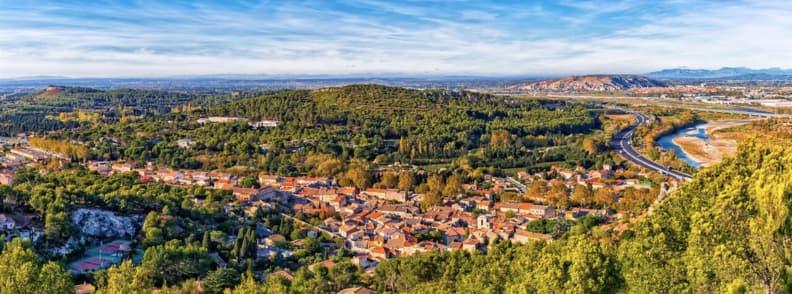
How to Choose a Village in South of France
How do you choose the right village in the South of France? Not the prettiest, or the trendiest, but the one you can live in, day in, day out, through heatwaves, post offices that are barely open when you’re at home, and winters when everything seems shut.
Because picking the wrong village in France isn’t just inconvenient. It can ruin your move.
What Most People Prioritize and Why It’s Not Enough
People usually start with the wrong checklist:
- It’s pretty.
- It’s close to the sea.
- It has a good market.
- There are other expats nearby.
That sounds smart, but it’s not enough to live on.
👉 Local Tip: Never choose a village based on how it feels in August. Come back in February.
What You Should Actually Look For
1. Who lives there, and what life stage are they in?
Our village is full of retirees and families who had kids decades ago. We came later, we now have a toddler, and it’s been hard to find other parents in the same stage of life. It matters more than you’d think.
2. Is it a real village or a dormitory?
Some villages look busy, but most homes are empty outside the holiday season. If everyone commutes to just sleep here or only comes down in July, you’ll feel alone 9 months of the year.
3. Can you actually afford to live there long-term?
Buying is expensive. Renting, also, since many landlords prefer to rent out to tourists during the season. And if you want to upgrade later for more space, a garden, a second child, you may find there’s nothing left you can afford.
4. Do you have at least one anchor?
A family member. A friend. An association. Without a built-in connection, village life can feel like camping long-term, no matter how pretty it is.
5. What services are reachable without driving too far?
That means: a doctor, a pharmacy, a dentist, a hospital for emergencies, a supermarket, a playground your kid will actually enjoy, a place with activities for your child, a café or restaurant that’s open in winter, a bank or at least an ATM…
👉 Before choosing a village, do a life test: plan a fake week and see what daily life would actually require and how far you’d drive to do it.
Mistakes to Avoid When Choosing a French Village
- Falling for “authentic” but impractical villages with no services, no community life.
- Underestimating how often you’ll need to drive. Not just for errands, but for schools, social life, even playgrounds.
- Assuming nearby towns make up for what’s missing locally because you won’t go as often as you think.
- Believing you’ll make friends just because it’s small. That only happens if people your age and life stage actually live there.
Choosing the best village in the South of France for expats isn’t about looks. It’s about fit.
You don’t just need charm. You need infrastructure, connection, and the right kind of people nearby.
We’ve made it work, but if I were advising someone now, I’d tell them this:
Start with what your life needs. Then find the prettiest French village that can support it.
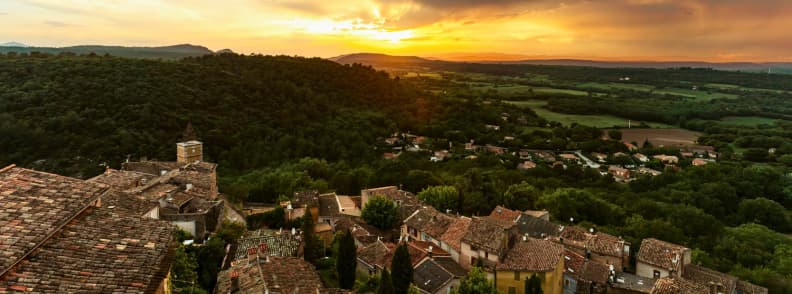
Should You Move to a Small Village in France?
We come back to the initial question: is moving to a small village in France right for you?
It depends, not on the dream you have, but on the life you’re ready to live.
And before you decide, you need to ask yourself some harder questions:
- Why do you want this life? If it’s just for the view or the markets, it’s not enough.
- Do you really speak French, or are you ready to work at it daily? Because without it, you’re not living here. You’re camping.
- Are you prepared for isolation, slower rhythms, and frequent driving? Life in the countryside looks beautiful. But without infrastructure, without a local community, beauty fades into frustration.
- Can you afford the real costs even five years from now? Housing, cars, taxes, repairs, childcare… None of these are getting cheaper.
- What support do you have, and what will you miss most? Family, old friends, old routines. You’ll leave them behind without guarantees that you’ll replace them easily.
👉 Moving to a small village isn’t an escape. It’s an exchange. You trade one life for another.
When people ask me if they should move to a small French village, I don’t answer right away.
I ask them questions instead: Where are you coming from? What do you expect? Do you know French? Do your children speak French? Have you thought about schools? About friends? About driving 30 minutes to buy the right diapers when you run out?
If they hesitate on these answers, I tell them to wait. Because once you move, once you realize that beautiful views don’t replace cultural life, that silence can turn heavy, that integration takes years, not months, it’s really hard to go back.
We came late. We had a child late. We are still building our life here carefully, piece by piece.
We love the place. We love the people we’ve slowly found. But nothing about this move was easy. And nothing about it was effortless.
Living in rural France as an expat is harder than it looks. And more beautiful than you expect, but only if you’re ready to work for it.
Personal Note / Disclaimer
I wrote this article while in Bucharest, surrounded by my family, my oldest friends, and the places where I grew up. I’ve been taking my son to playgrounds I once played in myself, visiting parks and events that don’t require hours of planning or driving. There’s more here, and it’s easier to access.
But still, I miss France. I miss my home. Because despite the loneliness, the silence, the social gaps, and everything else I’ve described, that little village in the South of France is where I feel rooted now. It’s where we’ve built our life. Where my son was born. Where the sunsets hit just right across the valley. That part is real, too.
What makes it hard is more personal. I’m an only child. My parents are getting older. And no matter how much I love the view from our window in Provence, I carry the guilt of being thousands of kilometers away from them. I don’t know yet how to reconcile those things: how to support them while living the life I chose with my own family. That’s something I need to figure out on my own.
About the Author

I’m Mirela Letailleur, a travel blogger and expat living in the South of France: not in a postcard-perfect fantasy, but in a real French village where the views are stunning and integration takes work.
I moved here from Bucharest after sailing the Med. My husband and I bought a house, we became parents, and I learned firsthand what life in a French village actually means: the costs, the silence, the beauty, the loneliness, the rhythm. On my blog, The Travel Bunny, I write honest, detailed guides about discovering France, budgeting as an expat, and what rural French life really looks like beyond the Instagram myths.
I don’t write to sell the dream. I write because I live it, and I want you to know exactly what it takes if you’re thinking about moving to rural France for good.
Thinking of moving to France or discovering more of this beautiful country? Read these travel guides:
Provence in Spring: A Comprehensive Local Travel Guide
Riding the Train des Pignes à Vapeur: The Best Steam Train Journey in France
Menton Travel Guide: A Sailboat Journey on the French Riviera

